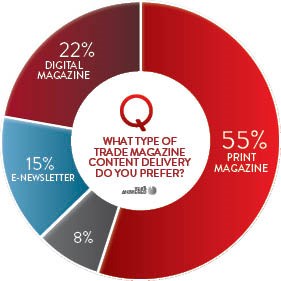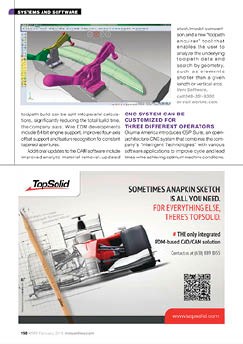Trade Publications Deliver Double ROI Punch: Advertising and Technical Know-How
When Dianna Huff first wrote about Gardner’s survey data, she took the tilt toward print with a grain of salt because Gardner is in the business of producing print. Since writing that post, she’s visited a number of small manufacturers where she sees that trade publications are seemingly thriving. To see if her assumptions were correct, she spoke with Rick Kline, Sr. CEO of Gardner Business Media.
By Dianna Huff
Founder and President
Huff Industrial Marketing, Inc.

According to the 2,288 manufacturing managers and engineers Gardner Business Media surveyed for their 2015 Media Usage research study, 86% ranked trade magazines as their number one and number two choice with regard to “effectiveness in terms of finding information.”

When asked what type of trade magazine content delivery they preferred, 55% of these managers and engineers said “print magazines.”

Since writing that post, I’ve visited a fair number of small manufacturers. The one thing I see, no matter the size of manufacturer or job shop, is trade publications: on lobby coffee tables; in the bathroom; on the shop floor. More important, I see them on people’s desks and credenzas.
Trade publications, despite the digital revolution (or maybe because of it), are seemingly thriving, thankyouverymuch.
To see if my assumptions were correct, I spoke with Rick Kline, Sr. CEO of Gardner Business Media.
Print Ad Trend: Smaller, Full-Color

I specifically wanted to know if Kline had seen any trends with regard to print ads. Were advertisers running more or less? Were they using QR codes or no? Based on the publications I read, it seemed more advertisers were running smaller ads.
Kline confirmed my hunch and noted the growing use of full-color in quarter, half-page, and island ad sizes. These ads get placed adjacent to editorial versus being stand-alone, the way full-page ads are. Thus, they’re more noticed by readers. And while the size is smaller, advertisers do pay a premium to run these ads in full color.
Print Advertising ROI – Does it Exist?
According to Kline, the more savvy advertisers use special phone numbers or URLs to track visits to a company’s website. “Many of our customers do measure traffic and get inquiries,” he said.
The perceived lack of ROI with regard to print advertising is what keeps companies from advertising. Yet smaller manufacturers and job shops will spend thousands of dollars on a 10’ x 10’ tradeshow booth – which may or may not deliver ROI.
“With print advertising,” says Kline, “you can run your ads during months when editorial is more appropriate to your products or services or you can run an ad in consecutive months. You can also take advantage of special tradeshow issues. The point is, print advertising is quite economical cost-wise, when compared to a tradeshow, and gets your company name in front of thousands of people – and for months after the publication has been printed.”
“Print exposes people to things they don’t know.”
Like all publishers, Gardner has the challenge of providing its message the way its audience prefers it. Delivery can happen on a tablet, a website, a smartphone, or print. “The device is the medium,” said Kline. “Print is a medium, too, and our audience does prefer it. The medium is important but what’s more important is the content.”
According to Kline, trade publications, including Gardner’s, give readers information they often don’t know about.

“Trade publications, and Gardner’s in particular, are filled with how-to information, application stories, and case studies. Our editors go out and talk to manufacturers and engineers to hear their success stories and challenges. Our editorial stresses new technologies. We want to help our readers improve their plants and be more competitive here in the U.S. and around the world.”
The difference between a print publication and a search engine, according to Kline, is that print is a “push” medium while search is a “pull” medium. With a search engine, you don’t know what information you’re missing because unless you know about something, you don’t know what to search for. And, with the search filter bubble, you may be exposed to content which by-and-large fits your worldview.
With a print publication, the information comes to you.
“Print exposes people to things they might not otherwise know or learn,” says Kline. “It’s one reason why people prefer it. For Gardner, we use the ‘push’ of print to deliver information readers will only find in the magazine.”
To ascertain readers’ needs and challenges, Gardner set up a LinkedIn Group open only to owners of small shops (no vendors or advertisers). “We simply listen to what these owners talk about,” says Kline.
It’s due to these reasons, and others, that the company has seen a 150% growth in print advertising in the last six years.
“We know our readers are older and that the younger generation is moving up the ranks,” says Kline. “We’re very aware of the technology mediums people use. It’s why we’re converting our websites to responsive design. But, technology is still just a medium. What really counts is the content – and in that, we’ll continue to remain focused on providing the application notes and technology stories our readers can’t find anywhere else.”
Need more information?
Dianna Huff
Founder and President
Huff Industrial Marketing, Inc.
37 Plaistow Road, Unit 7-245
Plaistow, NH 03865
603-382-8093
huffindustrialmarketing.com


RELATED CONTENT
-
26 Relevant Print Marketing Statistics: 2022 Ad Spending & Impact
Print marketing is not dead. Its impact on consumer brand recall and purchase decision is worth considering, especially if you want to implement an integrated, multi-channel approach to your marketing strategy. This article on marketing trends and predictions can provide more insights on strategies you can use for your business or marketing clients.
-
Everything You Wanted to Know About Industrial Marketing Today but Were Afraid to Ask
A game plan for new realities in industrial marketing. Trends becomes a tide. Younger buyers will soon call the shots. Be ready!
-
The Fisherman Approach to Print Advertising
Hook-less ads are a waste of money. Trade magazines with lots of information-hungry readers represent oceans of possibilities. You just need to know which bait to use. Here are some ideas to stop readers and reel them in.

